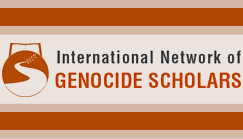Event Title
National Communism and the Roots of Poland’s Contemporary Memory Laws
Loading...
Submission Type
Video
Abstract
In January 2018, a scandal erupted as the Polish parliament passed new legislation regulating the memory of World War II: publicly stating that Poles collaborated with the Holocaust or with German authorities the war may lead to three years in jail and/or a fine. The law excludes academic and artistic contexts from retaliation. Similar memory laws have been passed in some of Poland’s neighbors, in Ukraine, Lithuania and Latvia. This recent legislation seeks to control the narrative of the war and to present the inhabitants of these countries as victims and rescuers, silencing historical debates on questions of collaboration. After negotiations with the Israeli government, in June, the Polish Prime Minister announced that the law would be amended. In return, the Israeli prime minister issued a statement with his Polish counterpart. The deceleration accepts the Polish narrative on the murder and rescue of Jews, highlighting Polish saviors and the Polish underground state’s role in hiding Jews, and rejects “the actions aimed at blaming Poland or the Polish nation as a whole for the atrocities committed by the Nazis and their collaborators of different nations.” This statement fulfills the aspirations of the very politicians who fifty years earlier, in 1968, succeeded in driving fifteen thousand Jews out of Poland. They too rallied against “anti-Polonism” and sought to protect the good name of the nation.
The rhetoric sounded by PiS is astoundingly similar to that the communist government used against protesting students in 1968. The language of contemporary Polish nationalism and its focus on the memory of World War II is closely related to the language of their predecessors, Polish nationalists who operated within the communist framework in the 1960s and 1970s. Polish rescue of Jews and the Righteous among the Nations are central themes in much of the 1967-1968 propaganda. As this talk will show, at the center of the battle between the communist government and the students in the late 1960s stood the question of the memory of war, with the communist party taking a Polish nationalist stance. From the 1968 events what has persisted is the ongoing clash over the writing of the history of Poland, over the role of the state in controlling the ways in which the past is studied and portrayed.
National Communism and the Roots of Poland’s Contemporary Memory Laws
In January 2018, a scandal erupted as the Polish parliament passed new legislation regulating the memory of World War II: publicly stating that Poles collaborated with the Holocaust or with German authorities the war may lead to three years in jail and/or a fine. The law excludes academic and artistic contexts from retaliation. Similar memory laws have been passed in some of Poland’s neighbors, in Ukraine, Lithuania and Latvia. This recent legislation seeks to control the narrative of the war and to present the inhabitants of these countries as victims and rescuers, silencing historical debates on questions of collaboration. After negotiations with the Israeli government, in June, the Polish Prime Minister announced that the law would be amended. In return, the Israeli prime minister issued a statement with his Polish counterpart. The deceleration accepts the Polish narrative on the murder and rescue of Jews, highlighting Polish saviors and the Polish underground state’s role in hiding Jews, and rejects “the actions aimed at blaming Poland or the Polish nation as a whole for the atrocities committed by the Nazis and their collaborators of different nations.” This statement fulfills the aspirations of the very politicians who fifty years earlier, in 1968, succeeded in driving fifteen thousand Jews out of Poland. They too rallied against “anti-Polonism” and sought to protect the good name of the nation.
The rhetoric sounded by PiS is astoundingly similar to that the communist government used against protesting students in 1968. The language of contemporary Polish nationalism and its focus on the memory of World War II is closely related to the language of their predecessors, Polish nationalists who operated within the communist framework in the 1960s and 1970s. Polish rescue of Jews and the Righteous among the Nations are central themes in much of the 1967-1968 propaganda. As this talk will show, at the center of the battle between the communist government and the students in the late 1960s stood the question of the memory of war, with the communist party taking a Polish nationalist stance. From the 1968 events what has persisted is the ongoing clash over the writing of the history of Poland, over the role of the state in controlling the ways in which the past is studied and portrayed.





Comments
View the agenda item.
View Anat Plocker's bio.